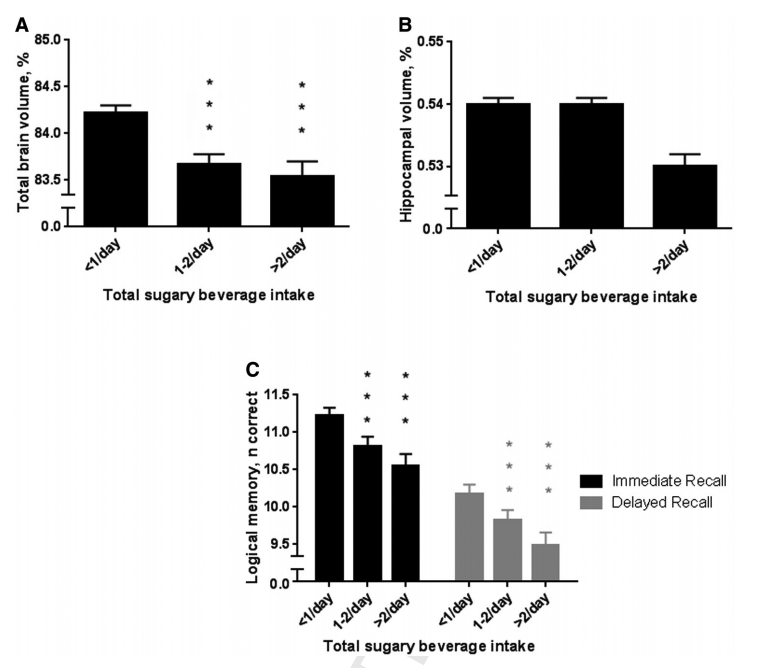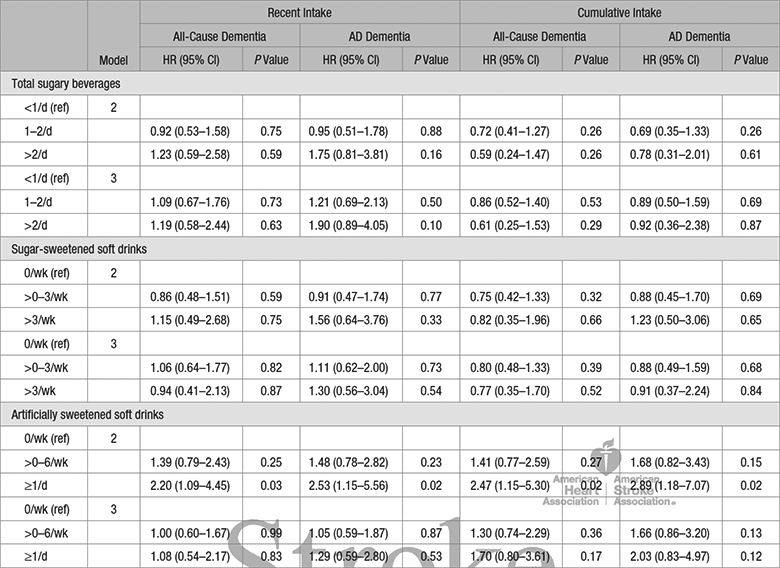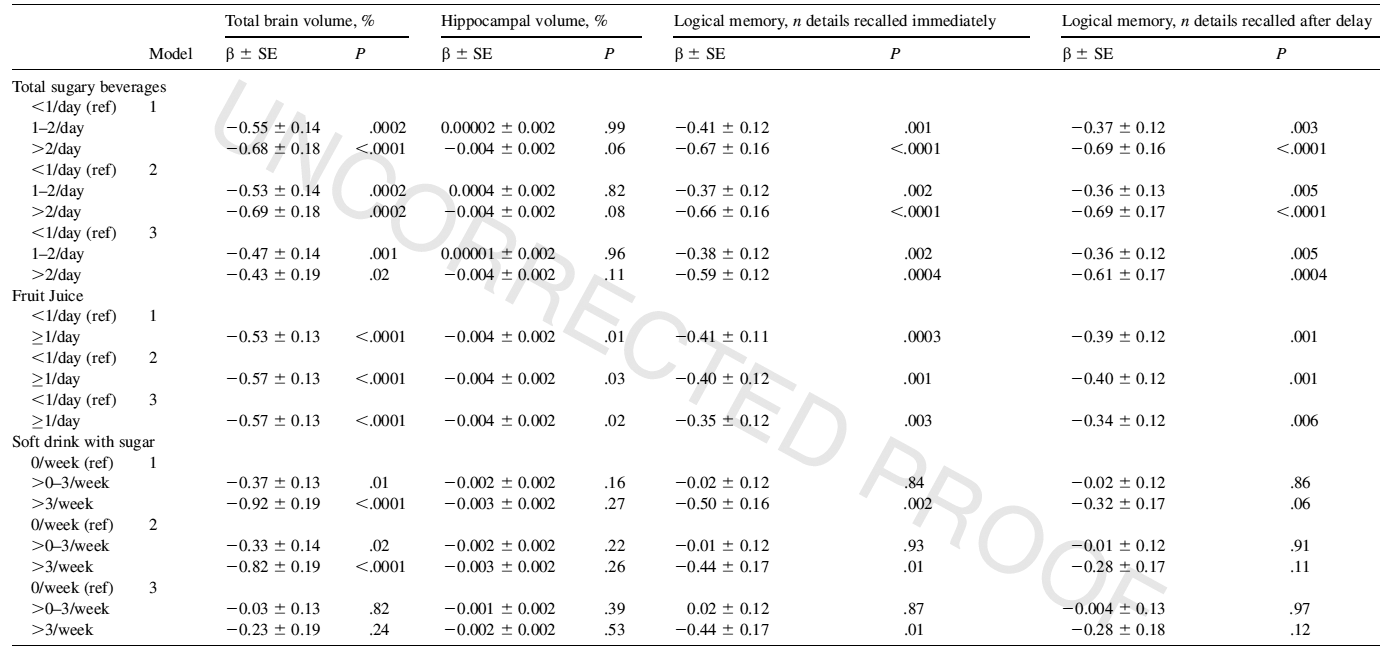The use of carbonated beverages for some reason correlates with brain volume

Frequent consumption of soft drinks and a reduced volume of the brain (A), the volume of the hippocampus (B) and the deterioration of the logical memory (C)
American scientists have conducted dozens of studies, but they were strange and somewhat conflicting results about the correlation of consumption of carbonated soft drinks and in brain volume . Immediately, we note that the question of the cause is not being considered; therefore, it is appropriate to speak only of correlation. Perhaps the consumption of carbonated beverages leads to a weakening of memory and mental abilities. Perhaps, on the contrary, impending dementia and low intelligence is the reason why people consume carbonated drinks. Within this correlation, any causal relationship is possible.
Scientists have put forward the theory that excessive consumption of sugar (fructose) may correlate with the subsequent deterioration of the brain. The fact is that recently it is customary to hang all the dogs for sugar - allegedly it is the cause of the total obesity of the US population, and the main factor is called carbonated drinks with sugar (cola, sprite, fanta), which many Americans drink instead of water.
Why carbonated drinks? This is indicated by statistics. According to the US Department of Agriculture, last year, the Americans ate 11 million metric tons of sugar, and most of this in the form of carbonated beverages. In fact, a two-liter bottle of the usual “Coca-Cola” contains 240 grams of sugar, that is, a quarter of a kilogram package! This is a powerful dose that is difficult to use in some other way: with tea, for example, or with solid food. Given that WHO recently revised its recommendations on added sugar and recommends that you limit your diet to 25 grams per day, i.e. 5 teaspoons, and not to abuse fruit juices. Thus, a liter bottle of cola contains a five-day norm of sugar, and a two-liter bottle contains a ten-day norm of an ordinary person.
So, Matthew Pase (Matthew Pase) with colleagues from Boston University decided to test the hypothesis that excessive sugar consumption with carbonated drinks correlates with deterioration of the brain. To do this, they used the data from the long-term study of the Framingham Heart Study (FHS), in which the health of Americans has been monitored since 1948.
As expected, scientists have identified a correlation. People who often drank fizzy drinks with sugar often had memory problems, less brain volume and a much smaller hippocampus volume — an area that is responsible for important learning and memory tasks.
But the most interesting thing happened then, when Matthew Paice conducted another similar study for people who drank diet soda without sugar(with artificial sweeteners). It turned out that in these people the risk of acquired (senile) dementia or stroke is three times higher than in other people! At the same time, no correlation was found between the consumption of sugary carbonated beverages and the risk of acquired (senile) dementia or stroke.

What happens? Carbonated drinks with sugar are harmful, but carbonated drinks without sugar are even more harmful? That is, before everyone talked about the dangers of sugar, and now it turns out that the harm lies in something else? Now it looks like the replacement with sweeteners does not improve the situation and does not allow to reduce the harm of carbonated drinks.
Apparently, researchers will have to revise existing theories and hypotheses and formulate the conditions of new experiments that will help answer the emerging questions - why are carbonated beverages harmful to health, what harm they cause to the cardiovascular system, how much they contribute to the development of diabetes and other diseases and how to reduce this harm.
It is important to note that the consumption of sugar in the form of fruit juice in the same quantities also correlates with losses in the brain volume and in the hippocampus volume (see table).

It is possible that if we conduct a study of regular frequent consumption of any drinks, except water, a correlation with an increased risk of certain diseases will be found.
However, it is very difficult to conduct such research objectively, because there are a huge number of factors influencing each other. It is absolutely impossible to understand where the cause and where the consequence. For example, people at risk of diabetes or suffering from diabetes tend to drink diet sodas with sugarless sweeteners. Thus, the increased risk of stroke or dementia may be somehow not at all associated with sweeteners in carbonated beverages, but with the original reason why these people drink such beverages — that is, with diabetes. Although scientists say that only this cause (diabetes), the results can not be explained.
The results of both scientific papers were published on March 5 and April 20, 2017 in the journal Alzheimer's & Dementia and Stroke: first article Sugary beverage in the community and Alzheimer's disease in the community (doi: 10.1016 / j.jalz.2017.01.024), second article Sugar- and Artificially Sweetened Beverages and the Risks of Incident Stroke and Dementia (doi: 10.1161 / STROKEAHA. 116.016027).
